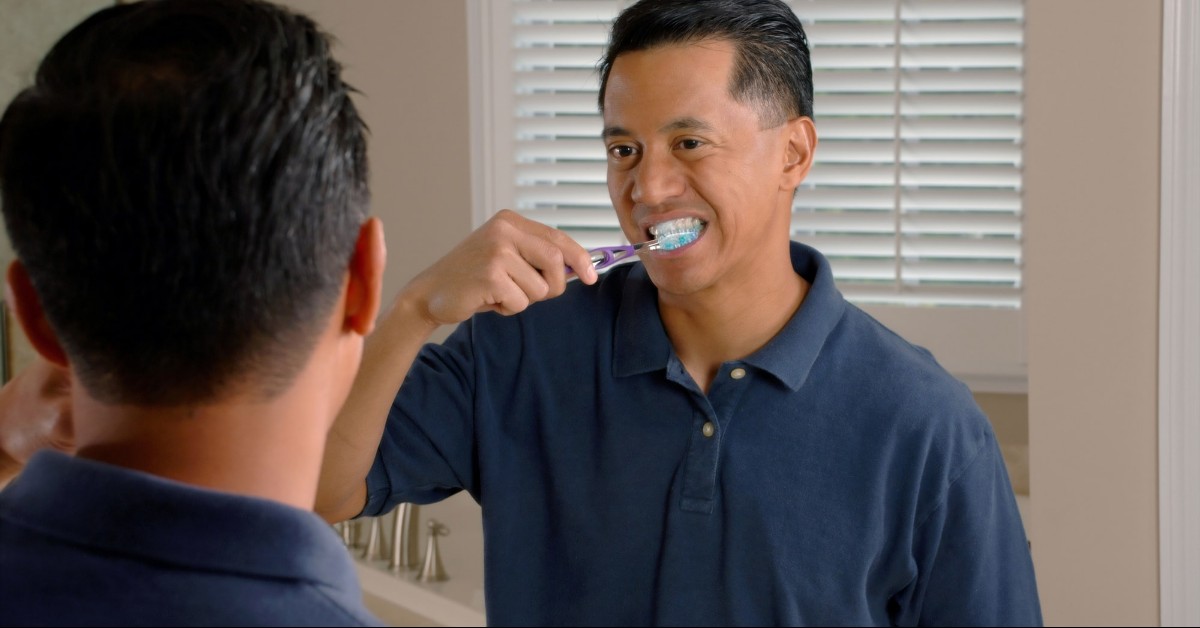Dental implant care requires a gentle hand and dedication to a daily routine. You may need to add a tool or two to your bathroom counter, but overall maintenance and care aren’t too different from traditional oral hygiene practices. With proper attention, your dental implants can offer better comfort and durability than dentures. They also provide a natural look and feel to reduce anxiety, making it easier to eat and live as you choose.
Twice Daily Brushing
Dental implants need brushing twice a day, just like the rest of your teeth. Use a soft-bristled toothbrush to prevent scratching the implant or irritating the gums. You want to be thorough but gentle with the implant and surrounding tissue.
Regular brushing removes food and plaque, a white film that naturally forms on the teeth and contains bacteria. That bacteria releases acid that breaks down tooth enamel, leaving you susceptible to cavities and other oral health problems.
While implants cannot get cavities, plaque build-up can affect the surrounding natural teeth and contribute to gum disease or infection around the implant. Regular dental implant care protects the hard and soft tissue around the implant from an infection called peri-implantitis. This disease can lead to failure of the implant and the need for further treatment.
Targeted Brushing Under and Around the Implant’s Crown
Be sure to brush under and around the implant’s crown. Pay special attention to the area where the crown meets the gums. The implant may be safe from decay, but the gums are not. Gum disease still poses a threat to an implant’s success, and as previously mentioned, the development of peri-implantitis.
Gentle, Low-Abrasion Toothpaste
Highly abrasive toothpaste can damage the surface of the crown or irritate the healing gums. Choose a gentle, low-abrasion toothpaste to protect the crown’s surface from scratches. Whitening toothpastes are the most abrasive as they remove the outer layer of dentin to expose the whiter material underneath. These toothpastes can cause sensitivity in the tooth and gums and potentially scratch the crown of your implant.
The Food and Drug Administration (FDA) requires an abrasion rating called relative dentin abrasivity (RDA) of all FDA-approved toothpaste. However, most manufacturers don’t include that information in their advertising or packaging.
You can check the abrasiveness of your toothpaste by rubbing a small amount of it on the shiny side of a piece of tin foil then washing away the toothpaste. Scratch marks left behind on the tin foil indicate the abrasiveness of the toothpaste. If you need a recommendation for a gentle toothpaste, call our office or talk to your regular dentist.
Floss Daily
Floss at least once a day to remove plaque and bacteria between the teeth and around the bottom of the crown. Be selective in the floss you use to fully support the structure of the implant. Unwaxed and implant-specific flosses work best. You can use a floss threader to make the process easier.
Some patients prefer to use a specialized toothbrush called an interproximal brush or proxabrush to clean between the teeth. These brushes have a narrow brush head that looks like a combination of a toothbrush and toothpick. The head fits between the teeth near the gums, gently removing debris.
Use an Oral Irrigator/Water Flosser
Oral irrigators, also known as water flossers, push pressurized water through the gaps between the teeth and around the gums. They take some getting used to, during which you may spray yourself or your bathroom mirror.
Oral irrigators are not a replacement for good flossing because they can’t reach the tightest spaces between the teeth. However, they’re a good way to rinse the area around the implant. They can also help treat irritated gums when flossing causes pain.
A Note on Removable Implant Dentures (Overdentures)
The previous suggestions apply to single and fixed dental implants. However, those with removable implant dentures, also known as overdentures, require a different approach. A healthy daily care routine includes:
- Removing and soaking the overdentures in a special cleaner
- Leaving the overdentures in the cleaner for the recommended time
- Daily checking clips, o-rings, and locator caps and calling your oral surgeon if parts are missing or worn out
- Using a denture brush to gently clean the underside of the overdenture
- Rinsing the overdenture before placing it in your mouth
A Final Word
Dental implants include some extra care requirements. Each part of the care routine is designed to prevent peri-implant disease and encourage the success and health of your teeth and gums. With proper care, dental implants offer a comfortable, natural function and feel that closely mimic natural teeth. Start your journey to better oral health by scheduling a free consultation at 561-833-6880.


